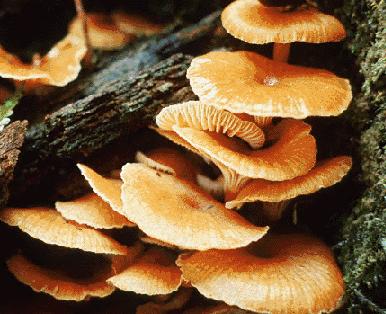Economical importance of Fungi
Fungi include many species which are of
economic importance to man . We are harmed and
benefited by Fungi directly or indirectly. Some account for beneficial and
harmful activities of Fungi is as under:
Useful
activities of Fungi:
(1)
Destruction of organic waste: Saprophytic Fungi decompose plant and animal
remains by acting as natural scavengers. Carbon dioxide released in the process
is used by green plants. By some workers saprophytic Fungi have been designated
as vegetative vultures.
(2) In
Industry:
(A) Many fungi are used in the commercial
preparation of many organic acids and some vitamin preparation. Aspergillus
miger, A. glaucus, A. clavatus, citronyces citricus have been recommended for
preparation citric acid. Many fungi also prepare gluconic acid lactic acid.
Aspergillus
and Fusaruim are source riboflavin, a constituent of vitamin B. Yeasts are also
rich in vitamin B.
(B) Recently Fungi have been founded to be
the basis of entire alcoholic industry. The basis of alcoholic industry is
production of ethyl alcohol by fermentation of sugar solutions by yeast. Yeasts
are source of complex enzyme zymase which is responsible for the process of
fermentation. Yeasts are used in making wines, bear and ciders.
(C) Certain yeasts Saccharamyces cerevisiaes
form important basis of baking industries.
(D) Some fungi such as species of
Penicillium are used in preparation of certain cheese.
(3) As
food: Many fungi like mushroom (Agaricus), Puffballs (Lycoperdon), Morels
(Morchella) are edible. They are important as protein sources. They are
regarded as delicacies of table.
Large scale
production of yeast is used in conversion of carbohydrates and in organic
nitrogen salts in to edible and nutritional forms. Yeast food supplies a number
of vitamins like thiamine, riboflavin, micotomic acid, Panthothenic acid,
biotin etc. Yeast food is there fore supplement of human food requirements.
(4) In Medicines or Medicinal value:
Recently many fungi have been founded to be responsible for producing certain
antibiotic drugs which inhibit the growth of pathogenic micro-organisms. Some
medicines formed from Fungi are Penicillin to kill bacteria that cause Pnemonia
streptomycin. Auroemoycin, chloromycetin and Ephedrine from yeast.
(5) In plastic manufacture: Certain Fungi
like odium lactis is widely used in plastic industry.
(6) Control and insect pest: Many Fungi
like Ascherronia deyroides, Isaria ferinosa, Empusa sepulchralis help in
controlling the infection of insect pests of the plants.
(7) Phytohormone or Auxins: Many growth
promoting substances like Gibberellins are synthesized from the fungi like
Fusarium maniforma and Dematium pullulans.
(8) Nutrition of plant: Many members of
Phycomycetes, Ascomycetes, Basidiomycetes and fungi imerfecii are involved in
the formation of mycorrhizae which are of fundamental importance in nutrition
of tree like Cycas, Zamia and Pinus.
Harmful
activities:
Fungi cause
diseases to human, animals and plants. They cause destruction to clothes,
paper, jute, leather, rubber, Paints, petroleum products, good grains and other
bakery products. Harmful effects are:
(1) Many fungi cause very much loss to our
timber trees by causing wood rot. Armillaria mellea, the honey mushroom causes
red rot of apple and many forest trees. Many species of Polypores attack forest
trees causing wood rot.
(2) Some would fungi like Rhizopus, Mucor,
Aspergillus spoil our food. Their spores are always in the air and settle down
on exposed jams, pickles, jelly, bread and fruits and develop mycelia and make
food articles unfit for human use.
(3) Some parasitic fungi are causative
agents of diseased of our cops, fruits and other economic plants. In them fungi
like Puccimia and ustilago cause rusts and smuts. They are great enemies of
crops and cause loss by reducing crop yield. The rusts reproduce yellow, orange
or black pustules on the stem and leaves of cereal plants while smuts attack
forests and produces a black powdery mass of smut spores in the place of seed
and fruits. Damage caused to cereals (wheat, maize, oat and barley) by rust and
smuts amounts to several hundred millions of rupees annually. Fungi diseases in
plants are:
(i) While rust of crucifers by crystopus
cindidus.
(ii) Powdery mildew by Erisiphae species.
(iii) Fruit root of apple by Rhizopus
arrhizus.
(iv) Late blight of Potato by Phytopora
infestans.
(v) Red rot of sugar came by colletorichum
falcatum.
(vi) Some parasitic fungi cause diseases to
animals.
Saprolegnia
which occurs as saprophyte on dead fish or flies behave as facultative parasite
producing serious diseases to crops and gold fishes.
(4) Some fungi are also cause some important
diseases in human beings. Asperigillus as A.miger, A.fiavus, A.fumigatus are
common human pathogens. Disease caused in aspergilloses of lungs and ears. Some
parasitic fungi live in mucous membrane of throad, bronchii and lungs. Few
fungi cause skin discoloration. A well known skin disease rung worm or “Dead”
is also a fungus disease.


thanks.....
ReplyDelete